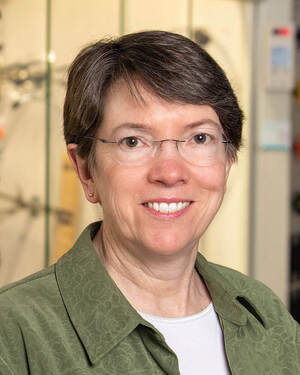
Holly Goodson, Professor of Chemistry & Biochemistry, has been selected as a Fellow of The American Society for Cell Biology (ASCB). She joins 18 other distinguished scientists from across the globe in the 2023 cohort of fellows. Her formal recognition will take place in Boston later this year at Cell Bio 2023, the joint meeting of the ASCB and the European Molecular Biology Organization (EMBO).
Goodson commented that she “is honored to be included in this notable group of scientists. I have long been inspired by the combined breadth and depth of both scientific questions and perspectives exhibited through the ASCB.”
Goodson’s research centers on biological self-organization, focusing on the microtubule cytoskeleton. The cytoskeleton is the structure that helps cells maintain their shape and internal organization, while also providing mechanical support. It is composed of multiple types of filamentous proteins, the largest of which are microtubules. Microtubules organize the cell’s cytoplasm, pull chromosomes apart at mitosis, and direct intracellular transport. Goodson uses a multifaceted approach to determine how the microtubules assemble, what governs their turnover, and how they interact with other parts of the cell. One of the key areas of focus in her lab is the development, alongside collaborators in applied mathematics, of agent-based computational models. These models have allowed Goodson to make connections across dimensional scales, a task that is very difficult to do with experiments alone, that show how kinetic characteristics of the subunits impact such parameters as stability and population level changes linked to disease states and abnormal cell functions.
Beyond research, Goodson serves the ASCB in advocating for sound research policies, currently as the Chair of the ASCB Public Policy Committee. Working with the ASCB Public Policy Director, she organizes and directs the work of the committee, which includes drafting and providing policy advice to Congress, the National Institutes of Health, and other pertinent organizations. She also broadly serves the cell biology community through educational initiatives, such as co-founding and leading the Integrated Biomedical Sciences Ph.D. program at Notre Dame, co-directing an NIH funded post-baccalaureate program (ND-PREP) to prepare researchers from under-represented groups for biomedical Ph.D. programs, providing summer research opportunities and support for high school teachers, and serving as the Science Director for the Glynn Family Honors Program.
Originally published by at chemistry.nd.edu on August 23, 2023.